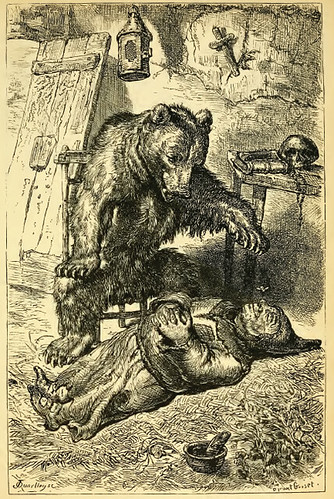[Notes by LKG]
This story is part of the Bidpai unit. Story source: The Tortoise and the Geese and Other Fables of Bidpai by Maude Barrows Dutton, with illustrations by E. Boyd Smith, 1908.

The Gardener and the Bear
At length, however, the good man wearied of having no one to talk to. He decided to go out into the world and find a friend, Scarcely was he outside the garden before he came face to face with a Bear, who, like the Gardener, was looking for a companion. Immediately a great friendship sprang up between these two.
The Gardener invited the Bear to come into his garden and fed him on quinces and melons. In return for this kindness, when the Gardener lay down to take his afternoon nap, the Bear stood by and drove off the flies.
One afternoon it happened that an unusually large fly alighted on the Gardener's nose. The Bear drove it off, but it only flew to the Gardener's chin. Again the Bear drove it away, but in a few moments it was back once more on the Gardener's nose.
The Bear now was filled with rage. With no thought beyond that of punishing the fly, he seized a huge stone and hurled it with such force at the Gardener's nose that he killed not only the fly, but the sleeping Gardener.
It is better to have a wise enemy than a foolish friend.
The Farmer, the Sheep, and the Robbers
The first Robber doffed his cap and said, "Good-day, sir, where are you taking this dog?"
The second said, "Good-day, Sir, where did you get this dog?"
The third Robber even stopped the Farmer, and inquired where his gun was. "For surely you would not have this dog with you unless you were going hunting," he added.
And the fourth Robber, coming up from the rear, put his hand on the Sheep's head and said, "Ah, my friend, what a fine watch-dog you have!" and went on.
By this time the Farmer was very angry. "In sooth," he cried aloud, "the man who sold me this beast bewitched my eyes, for truly I thought that it was a sheep, whereas in reality it is nothing but a dog. I will hurry back at once to find the fellow and make him pay me back my money."
So saying, he tied the Sheep to a tree by the roadside and started back to the fair on a run. Thereupon the four Robbers came out of their hiding-places and carried the prize off to their den.
The Tyrant who became a Just Ruler
One day, much to their surprise, he called his people together and said to them, "My dear subjects, the days of my tyranny are over. Henceforth you shall live in peace and happiness, for I have decided to try to rule henceforth justly and well."
The King kept his word so well that soon he was known throughout the land as The just King. By and by one of his favorites came to him and said, "Your Majesty, I beg of you to tell me how it was that you had this change of heart towards your people?"
And the King replied, "As I was galloping through my forests one afternoon, I caught sight of a hound chasing a fox. The fox escaped into his hole, but not until he had been bitten by the dog so badly that he would be lame for life. The hound, returning home, met a man who threw a stone at him, which broke his leg. The man had not gone far when a horse kicked him and broke his leg. And the horse, starting to run, fell into a hole and broke his leg. Here I came to my senses, and resolved to change my rule. 'For surely,' I said to myself, 'he who doeth evil will sooner or later be overtaken by evil.' "
(800 words)